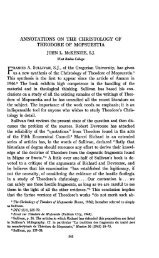SYMBOL, MYTH, AND THE BIBLICAL REVELATION AVERY ...
SYMBOL, MYTH, AND THE BIBLICAL REVELATION AVERY ...
SYMBOL, MYTH, AND THE BIBLICAL REVELATION AVERY ...
You also want an ePaper? Increase the reach of your titles
YUMPU automatically turns print PDFs into web optimized ePapers that Google loves.
<strong>SYMBOL</strong>, <strong>MYTH</strong>, <strong>AND</strong> <strong>THE</strong> <strong>BIBLICAL</strong> <strong>REVELATION</strong> 7<br />
holism, therefore, raises inevitably the problem of Christian mythology.<br />
Can it be admitted that myth has a function in revelation, in the<br />
inspired Scriptures, in the Christian religion? These questions are large<br />
and divisive. In order to approach them fruitfully, we must form some<br />
approximate idea of what the term "myth" means or should mean in<br />
such contexts. The very meaning of the term is much disputed, and<br />
the diversity of opinion on the questions just posed is largely due to<br />
this variety of definitions.<br />
For some writers, practically any numinous symbol may be characterized<br />
as myth. If myth is whatever points up the permanent<br />
spiritual dimension of events, thus linking them with their divine<br />
ground, it is obvious that any religion, including Christianity, must<br />
have its mythology. John Knox, working with a very wide concept of<br />
myth, says that if modern man cannot accept myth, religion is no<br />
longer a possibility. 9<br />
But the problem of myth is more acutely posed if one defines myth,<br />
as most do, in a narrower sense. Brevard S. Childs, in an important<br />
study, 10 distinguishes among several current meanings. First, there is<br />
the view of the so-called "mythical school'' of Old Testament critics<br />
(Eichhorn, Gabler, and G. L. Bauer), for whom myth is a primitive<br />
form of thinking in which unexplainable events are attributed to the<br />
direct intervention of deities. Secondly, there is the Form-Critical<br />
definition, held by the Grimm brothers, W. Wundt, and H. Gunkel,<br />
who look on myth as any story in which the active persons are gods.<br />
But neither of these two definitions is satisfactory. The first rests upon<br />
the unspoken rationalistic assumption that only a primitive mind<br />
could attribute anything to an interposition of divine power. The<br />
second definition is too exclusively literary and fails to do justice to<br />
the numinous and cultic dimensions normally associated with myth.<br />
A fanciful story told merely to entertain the imagination, even if some<br />
of its characters were deities, would not appear to deserve the name<br />
of myth.<br />
It seems best, therefore, to arrive at our definition of myth—as<br />
9 Myth and Truth: An Essay on the Language of Faith (Charlottesville, 1964) p. 28. For<br />
a similar view, see B. H. Throckmorton, Jr., The New Testament and Mythology (Philadelphia,<br />
1959) pp. 94-105.<br />
10 Myth and Reality in the Old Testament (Naperville, 1960) pp. 13-16.
















